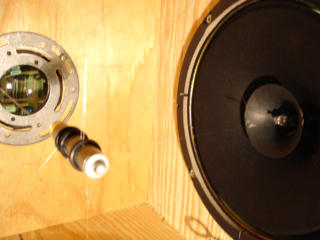|
|
Documentation for Laser X/Y Oscilloscope |
I built the box from 3/4" plywood, cut the holes for
the 4 speakers and another hole for the laser beam.
While rummaging for speaker wire, I found an old slide
projector, complete with lenses. I attached a biconvex
lens from the projector to the front of my wooden box.
I decided that I could get more thrust out of my brand- new speakers if I cut a 1/8" gap in the speaker cone at its outer edge. Yes, I sacrificed 4 new speakers! After gluing the suspension hooks, mounted and wired the speakers, then mounted the eyebolts to tie off the fixed suspension. Another problem: Mono-filament line is difficult to tie at precise lengths. I needed some adjustment ability, too. I used the typical knot used to tie off fishing hooks, plus an extra loop back. |
The laser pointer is
suspended by 2 sets of
lines: one fixed, one
driven by the speakers.
(Click on image for larger view.)
|
I used o-rings on the laser pointer for terminating both
suspensions and another o-ring to activate the laser's power
switch. I could adjust the center position of the
laser by not tying a knot, rather passing the line under
the o-ring and with an adjustment screw on one end of each
of the fixed suspension lines. After some trials, I glued
the knots on the speaker end of the driven lines.
I mounted the main lens from my slide projector to a microphone table stand so I could move it to focus the image on the screen, far simpler than building a mount on the wooden box. It also made the whole rig easier to transport. I also added 4 door stops to the bottom of the box since the bottom speaker extended a couple of inches from the box. After my class presentation, Professor Sandy Stone suggested that I improve compliance and frequency response by using drawn glass rods in place of the fishing line and metal clamps in place of the o-rings. I have also thought about removing the laser diode from its housing, suspending only the laser diode, mounting the batteries to the wood box, then using small-guage wire for electrical connections. |
Page 2
|
